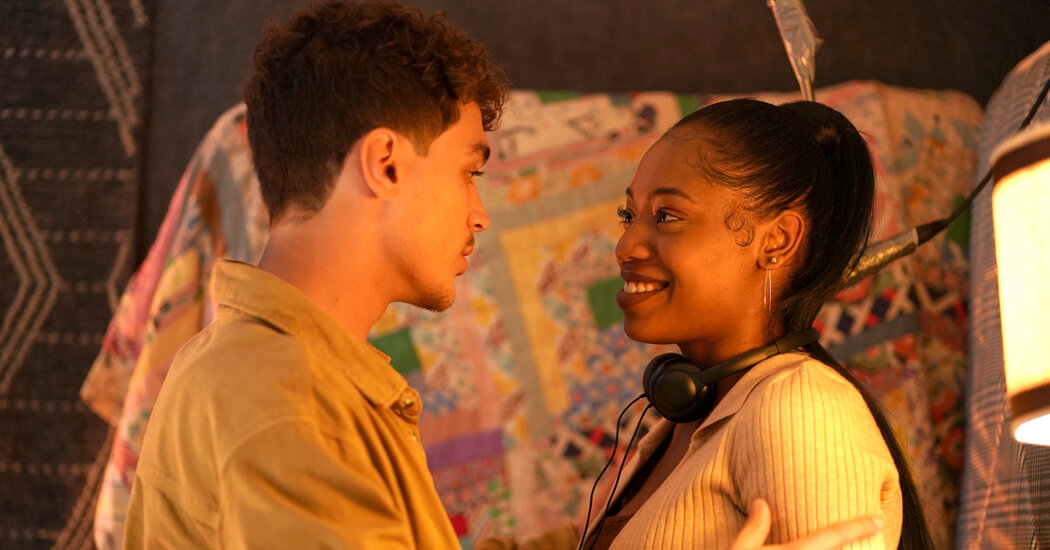
‘Cinnamon’
Jodi (Hailey Kilgore) is working her late shift at a gas station when a biker in a helmet enters to rob the joint. The biker kills a Black customer in a cowboy hat before fleeing into the night. Jodi appears shocked. But she shouldn’t be. The thief is her boyfriend, Eddie (David Iacono). They’re in cahoots.
This film relies on smart world-building by way of a memorable ensemble. Eddie and Jodi are childhood friends, who, three months before the robbery, reconnected on a bus. Jodi is an aspiring singer and actress stuck in her dead-end job; Eddie is a petty criminal who conjures up a plan to finance Jodi’s career by fleecing her crooked boss, Wally (Damon Wayans). But by swindling Wally, they’re also, inadvertently, stealing from his deadly investors, a Black cowboy crime family led by a blind matriarch (Pam Grier).
“Cinnamon” is funny and sweet, centering Jodi and Eddie’s young love, but Grier gives this action-comedy an enthralling, menacing side, elevating it from its meet-cute foundation into an intense, bloody crime flick.
It’s 1975; the Troubles are raging. The retired Irish Republican Army paramilitary Michael O’Hara (Colin Morgan) is taking his wife, in labor, to a hospital. In an attempt to ambush O’Hara, a British special forces member, Tempest (Aml Ameen), accidentally kills O’Hara’s wife, while his target escapes. Rather than punishing the sharpshooting Tempest, Holland (Mark Strong) a British intelligence official, assigns him to a police unit tasked with hunting the I.R.A. The injustice leads O’Hara to come out of retirement to kill Tempest.
While the directors Tom and Charles Guard’s “Dead Shot” features your standard revenge thriller viciousness — initially, neither O’Hara nor Tempest cares about what stray bullets or random explosives affect Londoners — mixed with espionage paranoia, the film is really a critique of retribution killing. The two men eventually question the moral imperatives of their superiors, and of their own their place in the world (Tempest, a Black man, fighting a white man’s war), and what exactly bloodshed accomplishes when it only begets more bloodshed.
‘Foggy Mountain’
It’s not uncommon for lesser action films to prize convoluted plotting over choreographed fight scenes. For the Vietnamese directors Phan Anh and Ken Dinh’s well-crafted “Foggy Mountain,” the opposite proves true. The plot is simple: An underground fighter named Phi (Peter Pham) attempts to leave the clutches of a maniacal fight promoter, gangster and human trafficker, Ba Rau (Thach Kim Long). In turn, Ba Rau murders Phi’s blind wife, causing Phi to seek revenge by venturing to Ba Rau’s stronghold, the foggy mountain.
Most important, this film loves capturing well-crafted conflicts. I stopped counting within the first half-hour — by that point five skirmishes had occurred — but suffice to say, there’s not only a plethora of fights, but they’re also all immersive and bruising. The agile camera movement is a particular highlight: The lens glides so smoothly during the fights, it feels like the camera is attached to the actors’ fists, taking us along for the ride.
‘River Wild’
When Joey (Leighton Meester) leaves her stressful life to go whitewater rafting with her brother, Gray (Taran Killam), and Trevor (Adam Brody), their troubled friend from childhood, “River Wild,” a survivalist film by Ben Ketai, follows in the footsteps of “Cliffhanger,” “Firestorm” and “Vertical Limit.” Taking on two random British tourists — Van (Eve Connolly) and Karissa (Olivia Swann) — the group begins rafting through dangerous channels, only to discover the real terror is sitting beside them.
The predatory Trevor is anguished, vindictive and desperate, particularly in the face of confident women like Joey and Van. Trevor attacks Van with a rage that is only matched by the rushing water. Fearing a return to prison, Trevor takes the rafters hostage. Joey resourcefully maneuvers around this deranged man and, by intertwining the dangers of nature in a climactic whitewater chase scene, the film fashions Meester into an action star akin to Sylvester Stallone or Howie Long.
Unlike “Foggy Mountain,” the Chinese writer-director Michael Chiang’s “Wolf Pack” features complex plotting and dense action. The MacGyver of physicians, Ke Tong (Aarif Lee) has spent his life retracing his murdered father’s footsteps by traveling the world to war-torn areas. When Ke Tong is kidnapped by a secret group of noble mercenaries led by Diao (Max Zhang) — his deceased father’s best friend — he becomes enveloped in a geopolitical crisis, helping the team defuse a bomb rigged to counterfeit, pressurized regulators at a natural gas plant in China.
Though the film concerns Ke Tong’s personal search to discover why his father was a mercenary, the pleasure of “Wolf Pack” really resides in this team of killers. Seeing this group in firefights is engrossing: The sharp editing delights in capturing their quick movements and the ways they seemingly move as one organism, giving these scenes a transfixing rhythm and sheen above other common war movies.













